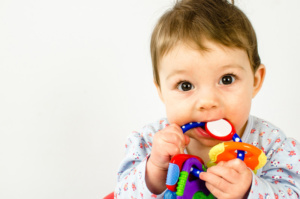Your Baby & Teething
The initial signs of your baby teething is a significant milestone in their development, and one that will likely see you as a parent sharing photographs with family, friends, and anyone else who is nearby! Unfortunately, the arrival doesn’t always go smoothly; it can be a testing time for both you and your baby. There will inevitably be some discomfort involved, and this can lead to yet more sleepless nights and grumpy behavior.
Signs of Teething
There are usually advanced signals that a tooth is on its way. These warning signs can include an increase in salivation or drool, and a tendency for your child to bite down on toys (or even individuals). Other symptoms consist of swollen gums and flushed cheeks, a loss of appetite, difficulty going to sleep and irritability.
Parents will tell you that teething can be accompanied by other problems such as upset stomach and colds. Many medical experts say that there is no real connection and that young children are more or less continually fighting off one bug or another, and so any signs of illness appearing together with teething are probably just coincidences.
For an infant, teething starts at around six months, as with all things related to babies and children your own experience may vary. Indeed, very few babies will be born with a tooth or two. Most will not see their first tooth emerge until around their first birthday. Whenever it first starts, your child will have a complete set of teeth by the time they reach three years of age. These milk teeth will last until the child is around the age of six. Around the age of six is when their adult teeth will replace them.
Some infants breeze through the whole teething process with little difficulty, and others it can be a real ordeal. Unfortunately, there’s nothing parents can do to expedite the growth. However, there are ways to relieve the discomfort of teething.
Remedies for Teething
The traditional remedy for teething pain is a rubber biting ring. The teething ring works with your baby’s natural inclination to bite down on things when they feel irritation. A soft rubber ring gives a safe outlet for the urge to bite. Try to keep the ring in the refrigerator when not in use so it will provide a cooling sensation.
A teething gel can also be applied directly to the gums. The gel can help aid in the irritation or discomfort the child is feeling. The teething gel can be used onto a dummy or pacifier if the biting reflex of the child is risky for the parent!
Teething powders are a viable option. They consist of a sachet of crystals which you can pour into your baby’s mouth, and they have seemed to be more efficient than gels with some children.
Finally, you may have to resort to pain relief medication if the problem becomes severe. Be sure to use a dosage specially formulated for your child’s age, and stick to the recommended dosage. A medicine which also induces drowsiness, such as anti-fever preparations, can be beneficial – especially at bedtime.
Hopefully, your child will not have too much difficulty developing healthy toothy smile, but if you’re finding teething is a problem, please remember that it doesn’t last forever, and keep counting the teeth as they arrive!
Please click here to read more tips about great oral hygiene.

